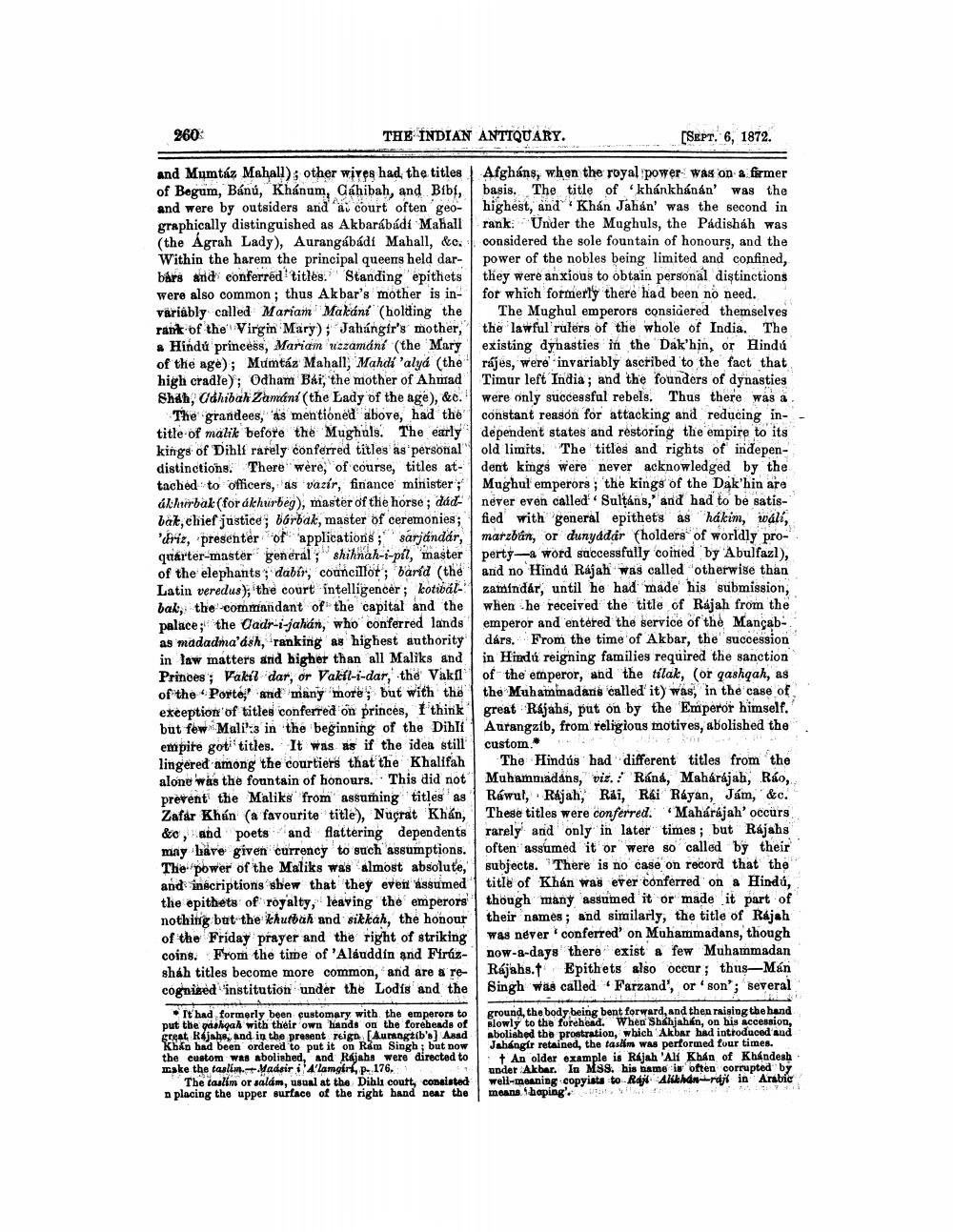________________
260
THE INDIAN ANTIQUARY.
[Sept. 6, 1872.
and Mumtaz Mahall), other wives had the titles Afgháns, when the royal power was on a former of Begum, Bánú, Khánum, Cahibah, and Bibi, basis. The title of khánkhánán' was the and were by outsiders and a court often geo- highest, and Khán Jahán' was the second in graphically distinguished as Akbarábádi Mahall rank: Under the Mughuls, the Pádisháh was (the Agrah Lady), Aurangabadi Mahall, &c. considered the sole fountain of honoury, and the Within the harem the principal queens held dar- power of the nobles being limited and confined, bars and conferred titles. Standing epithets they were anxious to obtain personal distinctions were also common; thus Akbar's mother is in- | for which formerly there had been no need. variably called Mariam Makání (holding the The Mughal emperors considered themselves rant of the Virgin Mary); Jahangir's mother, the lawful rulers of the whole of India. The * Hindú princess, Mariam uszamání (the Mary existing dynasties in the Dak'hin, or Hindu of the age); Mumtaz Mahall, Mahdí 'alya (the rájes, were invariably ascribed to the fact that high cradle); Odham Bái, the mother of Ahmad Timur left India, and the founders of dynasties Shah, Cáhibah Zamání (the Lady of the age), &c. were only successful rebels. Thus there was a
The grandees, as mentioned above, had the constant reason for attacking and reducing in- - title-of malik before the Mughals. The early dependent states and restoring the empire to its kings of Dihli rarely conferred titles as personal old limits. The titles and rights of independistinctions. There were, of course, titles at- dent kings were never acknowledged by the tached to officers, as vazir, finance minister; Mughul emperors ; the kings of the Dak'hin are ák hurbak (for dikhurbeg), master of the horse ; dád- never even called Sultáns,' and had to be satisbak, chief justice; bárbak, master of ceremonies; 1 fied with general epithets as "hakim, wali, drit, presenter of applications; sarjándár, marzbán, or dunyddar (holders of worldly proquarter-master general; shihnah-i-pil, master perty- a word successfully coined by Abulfazl), of the elephants dabir, councillot; barid (the and no Hindú Rájah was called otherwise than Latin veredus), the court intelligencer; kotivál zamindár, until he had made his submission, bal, the commandant of the capital and the when he received the title of Rajah from the palace; the Cadr-jahan, who conferred lands emperor and entered the service of the Mancabas madadma'dsh, ranking as highest authority dárs. From the time of Akbar, the succession in law matters and higher than all Maliks and in Hindú reigning families required the sanction Princes; Vakil dar, or Vakfl-i-dar, the Vakfl of the emperor, and the tilak, (or qashqah, as of the Porté," and many more, but with the the Muhammadans called' it) was, in the case of exeeption of titles conferred on princes, I think great Rajahs, put on by the Emperor himself.' but few Mali: in the beginning of the Dihli Aurangzib, from religious motives, abolished the empire got titles. It was as if the idea still lingered among the courtiers that the Khalifah The Hindús had different titles from the alone was the fountain of honours. This did not Muhamniadans, viz. : Ráná, Maharajah, Ráo, prevent the Maliks from assuming titles' as Ráwul, Rajah, Rai, Rai Rayan, Jám, &c. ZafẠI Khán (6 favourite title), Naerat Khán,1 These titles were conferred. Mahárájah' occurs &c, and poets and flattering dependents rarely and only in later times; but Rájahs may have given currency to such assumptions. often assumed it or were so called by their The power of the Maliks was almost absolute, subjects. There is no case on record that the and inscriptions shew that they even assumed title of Khán was ever conferred on a Hindú, the epithets of royalty, leaving the emperors though many assumed it or made it part of nothing but the khutbah and sikkah, the honour their names; and similarly, the title of Rajah of the Friday prayer and the right of striking was never conferred' on Muhammadans, though coins. From the time of 'Alauddin and Firúz- now-8-days there exist a few Muhammadan shah titles become more common, and are a re- Rájahst Epithets also occur ; thus-Mán cognized institution under the Lodis and the Singh was called Farzand' or 'son'; several
It had formerly been customary with the emperors to ground, the body being bent forward, and then raising the hand put the poshqal with their own hands on the forebeads of |
Blowly to the forehead. When Shahjahin, on his accession, great Rjabe, and in the present reign [Aurangzib's Abad abolished the prostration, which Akbar had introduced aud khán had been ordered to put it on Ram Singh, but now Jahangir retained, the taslim was performed four times. the custom was abolished, and Rajahs were directed to An older example is Rajah 'Ali Khan of Khandesh make the taslim. Wadeir 'lamgir, p. 176.
ander Akbar. In Mss. his name is often corrupted by The taslim or salám, usual at the Dihli coutt, consisted well-meaning copyiata to Roy Ald .dk in Arabic n placing the upper surface of the right hand near the means hoping'. :.




